#leigong
Explore tagged Tumblr posts
Text
Family of Sages
I mentioned in this post about possible Celestial Water Monkeys; that one Ming-dynasty opera (written nearly 200 years before the Jttw novel) depicts the "Wuzhiqi" (a simian water demon) as a sister to Sun Wukong.
@journeytothewestresearch did an article or two on this particular play, and how there's a possibility of there being multiple "Great Sages" throughout folklore.
The play itself is pretty bawdy given that it's writer was known for adult comedy; with "Sun Xingzhe" being a bit of horndog (only stopped by the circlet), based on a popular cryptid of the time infamous for stealing women.
Other details include;
Red Boy (true name being Ainu’er) being the son of the Bodhisattva Manjushri and the ancient demon-mother-goddess Hariti (comparable to the Echidna of Greek mythology).
The nine skulls on Sha Wujing's neck representing the nine previous lives of the Golden Cicada. (cool af)
Zhu Bajie being afraid of nothing (hah!) but Erlang's dog Xiaotian Quan.
Princess Iron Fan being unmarried, to which Sun Xingzhe offers to be her husband (guess people were shipping them even back then, explains Goku and Chichi).
Tripitaka returning to Chang'an without his pilgrim buddies, instead the Buddha gives him four bodyguards of his own for the return trip. The demons aren't allowed go back East. Kinda sad.
So it's best to take the characterisation with a grain of salt, though it has some cool ideas.
The family sound off is presented as this:
"We are five brothers and sisters: my elder sister is Lishan Laomu [離山老母, Venerable Mother of Mount Li], my second sister Wuzhiqi Shengmu [巫支祇聖母, Holy Mother Wuzhiqi]; my older brother is Qitian Dasheng [齊天大聖, Great Sage Equaling Heaven], I myself am Tongtian Dasheng [通天大聖, Great Sage Reaching Heaven], and my younger brother Shuashua Sanlang [耍耍三郎]"
Wukong introduces himself as "Tongtian Dasheng [通天大聖, Great Sage Reaching Heaven]". But his older brother has the title of Qitian Dasheng [齊天大聖, Great Sage Equaling Heaven].
Another later story mentioned in the article has the "Cinnabar Cloud Great Sage/Danxia Dasheng"; a red-furred staff-wielding monkey who acts as an antagonist towards the main goddess character. Curiously is described as both a peach thief, a survivor of Laozi's furnace, and a frequent identity-stealer (possible Six Eared Macaque?). He is punished for being so naughty by getting neutered (ouch).
And of course there is the God of Thunder Leigong aka "Sire/Duke of Thunder", who is often depicted as a celestial monkey/ape working as the muscle and executioner for the Jade Emperor. Became immortal after eating a Peach dropped by a fox demon (Jiuweihuli?) arguing with Celestial soldiers. Is married to the Goddess of Lightning Dianmu, who lights up the sky to help her husband see his targets. He is said to be one of Five Brothers, leading to more connections.
So theres;
Lishan Laomu/"Venerable Mother of Mount Li" - Eldest sister/sibling. Curiously named after a popular goddess of the same name said to be equal in power to Nüwa, and possible Mother Nature itself. Said goddess appears in Jttw as a companion of Guanyin, and helps out Wukong when the rest of the hang were poisoned.
Wuzhiqi Shemu/"Holy Mother Wuzhiqi" - Second elder sister. Her name is associated with an aquatic flood demon with a stretchy neck - bound to the bottom of mountain/sea by Yu the Great (original owner of the Ruyi Jingu Bang) with iron chains.
Qitian Dasheng/"Great Sage Equaling Heaven" - older brother. Has the traditional "Great Sage Equal to Heaven" title. Makes me think of Dasheng from HIB.
Tongtian Dasheng/"Great Sage Reaching Heaven" - second brother aka the version of Sun Wukong/Xingzhe in the play. Is closer to "Quagmire" than Sun Wukong tbh.
Shuashua Sanlang/"Playful Third Brother" - youngest brother. Not much is said about him. His name literally means "Playful Third Brother". Might be the baby of the family.
+Danxia Dasheng/"Cinnabar Cloud Great Sage" - red-furred Wukong double. Got neutered for being naughty.
+Leigong/Duke of Thunder - Actual thunder god.
This gang of monkeys siblings is likely what led to the depiction of the "Four Stalwart Generals" who are Wukong's closest monkey companions. But now I'm imagining an universe/au where the Stalwarts are all similarly orphaned celestial monkeys of deferring elements who adopted one another.
Danxia/Cinnabar Cloud is an odd mix of both Wukong and the Six Eared Macaque. Possible kid? Maybe inspired ideas of Wukong being red furred. His shenanigans even remind me of Monkey from the netflix Monkey King (2023).
And of course Leigong... Jade Emperor sends a monkey to kill a monkey, and is shocked when Wukong survives. Leigong is like an old blue-collar worker who refuses to work if it violates his union rights - even orders from the King of the Universe.
#stone monkeys#the four stalwarts#the other celestial primates#sun wukong#jttw#journey to the west#leigong#duke of thunder
34 notes
·
View notes
Text









More old scribbles and prompts
#mine#my art#ffxiv#ffxiv au’ra#ffxiv WoL#ffxiv viera#there is 1 (one) viera in there im sorry#ffxiv Azem#Gihbreel#Ocavisha#Genesius#friends#Leigong
7 notes
·
View notes
Text
So I was doing more research (like you do), this time here:
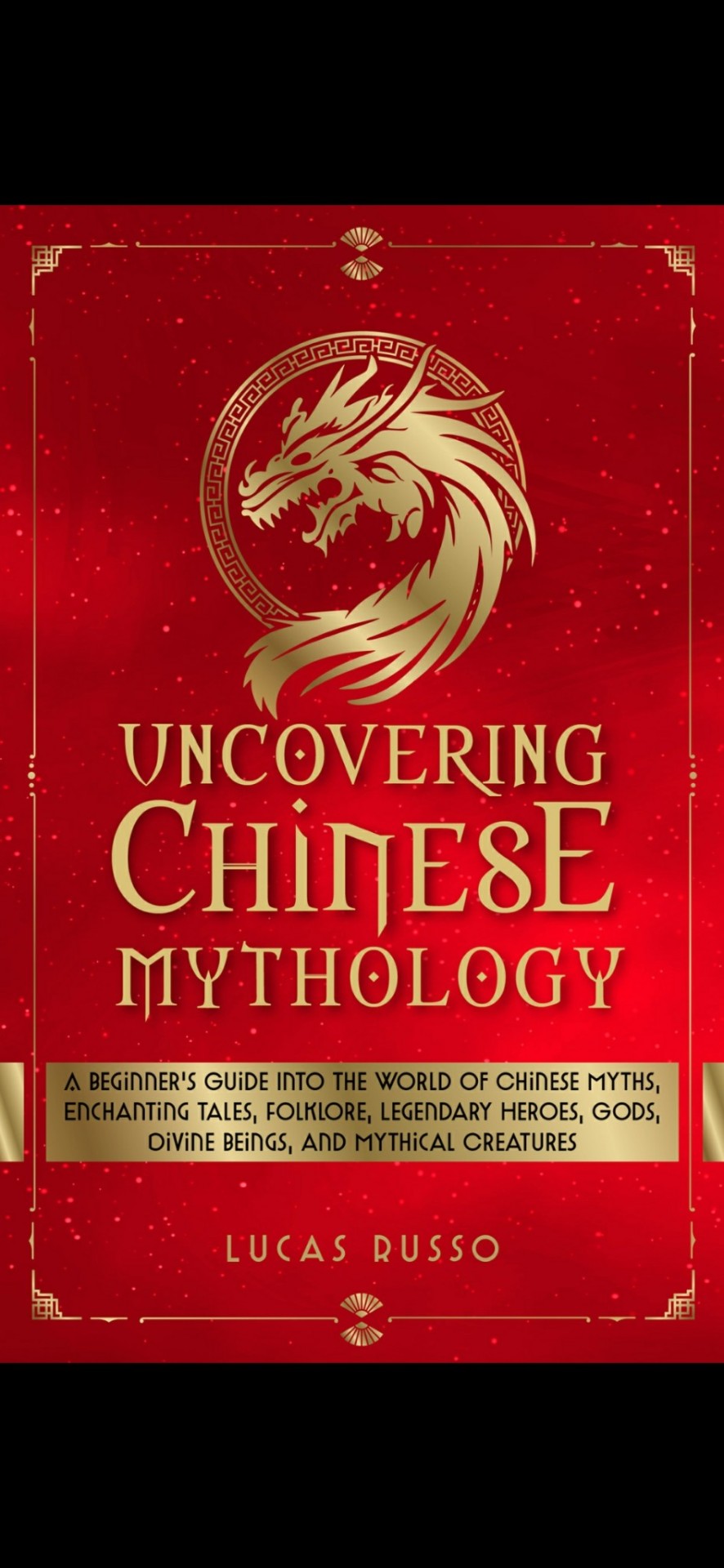
It's like, a dollar on Kindle, but anyway.
I was reading the section about Xiwangmu, the Queen Mother of the West (pg 35), and it said that her consort was Dongwanggong, the King Father of the East, NOT the Jade Emperor. While this is likely just the kind of inconsistency that happens to a mythology over eons and vast distances, but it got me thinking about a story from my other source:
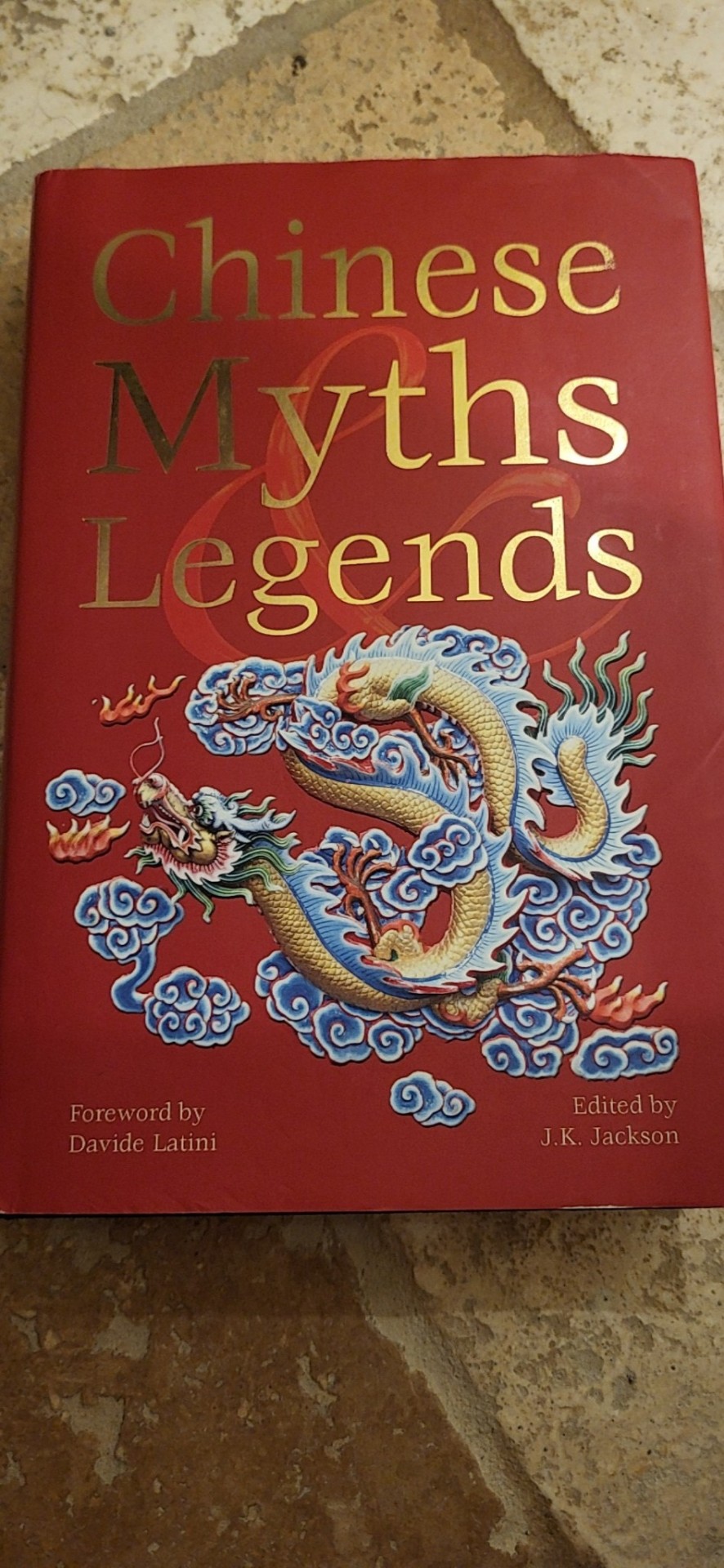
The story of the Queen of Heaven, Tian Hou/Tian Fe Niang Niang (pg 104). Now, being described as the Queen of Heaven one would expect her to be consort to the ruler of heaven, the Jade Emperor, but I couldn't find any sources claiming that. They all said the Jade Emperor's consort was Xiwangmu.
I also had Nu Wa, an early earth goddess, on the mind because she shows up in both books. Her parentage is a bit wobbly because of how old she is, with some sources claiming her to be the daughter of the Jade Emperor, while others say she's the child of Huaxu (another powerful goddess) and Leigong, the god of thunder, along with her twin brother/husband Fu Xi.
Now, taking all this scattered and messy mythology I thought: how can I clean this up so it fits in a modern story (like LMK) in a way that makes sense? Here's what I came up with:
The Jade Emperor and Xiwangmu are both on their second marriage. JE's first wife was Tian Hou, XWM's first hubby was DWG. Both couples split for some reason before JE and XWM got together.
Nu Wa is a child from XWM's first marriage with DWG, making her JE's stepdaughter rather than his biological daughter, while Fu Xi is still the child of Huaxu and Leigong because I know gods are different, but incest is still yuck.
I know trying to iron out mythology is a pointless endeavor because they were never meant to hold together in the first place, but I think I did pretty well here. Thoughts?
Sh*tpost Masterlist
#mythology sh*tposting#lmk#lego monkie kid#journey to the west#chinese myths and legends#davide latini#jk jackson#uncovering chinese mythology#lucas russo#chinese myths#theories my theories#headcannons#Xiwangmu#the jade emperor#nuwa#fuxi#tian hou#tian fe niang niang#leigong#huaxu#Dongwanggong#chinese mythology#mythology#mythology and folklore#chinese mythology character ideas#queen mother of the west
14 notes
·
View notes
Text

Leigong, Lord of Thunder.
#chinese mythology#artificial intelligence#leigong#a.i.#雷公#a.i. generated#leishen#a.i. art#雷神#god of thunder#mythology#china#taoism#lord of thunder
1 note
·
View note
Text
all the chinese mythology parallels for hmc are coming together…!
#doing some research (aka browsing mainly wikipedia)#and some of these myths… i can incorporate them really well methinks#phantylia with ties to daji? a malevolent woman/spirit who enjoyed torturing people and indulging in her own pleasures? oh yes#jing yuan and leigong parallels? punishing/ dealing with the guilty and dangerous? gimme#reader and dianmu parallels (dianmu is leigong’s wife)? mhm… although i have to find a way to incorporate mirrors now somehow#mimi as baize? yes yes yes#don’t know whether fu xuan will have any fancy parallels though… sorry#if anyone has any ideas hit me up#sorry for the ramble in the tags but it’s so satisfying when your research begins to click#r’s random thoughts#au: general’s flying ship#the editing may be fun yet
9 notes
·
View notes
Text
Leu Leigong, most promising rookie hunter of Marama’s Investigators
They/Them

5 notes
·
View notes
Text
[Hanfu · 漢服]Chinese immortal Hanfu <电母/Mother of Lightning> Based On Yuan Dynasty Taoist Temple Mural<永乐宫/Yongle Palace>
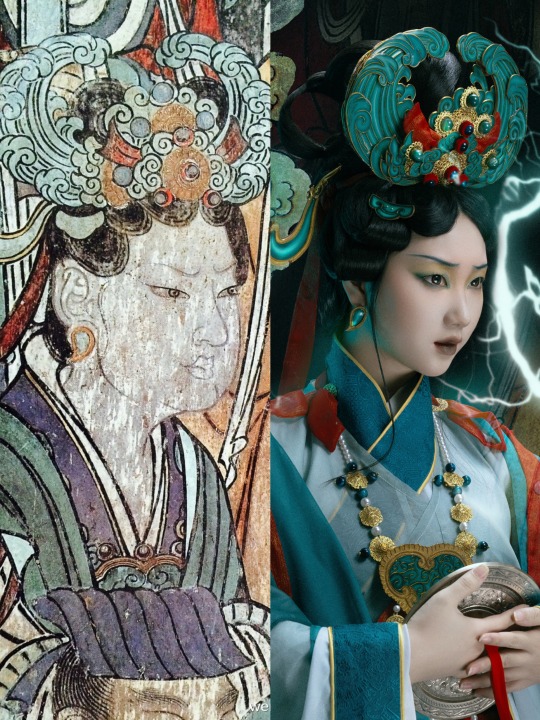
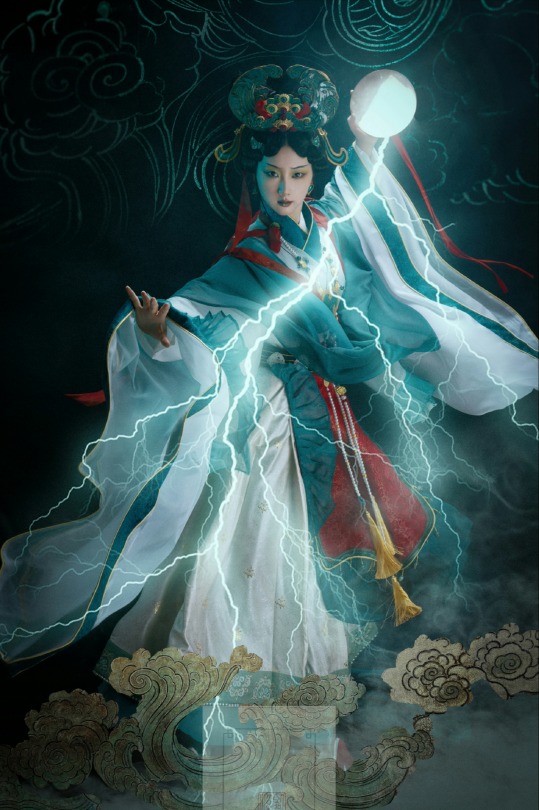
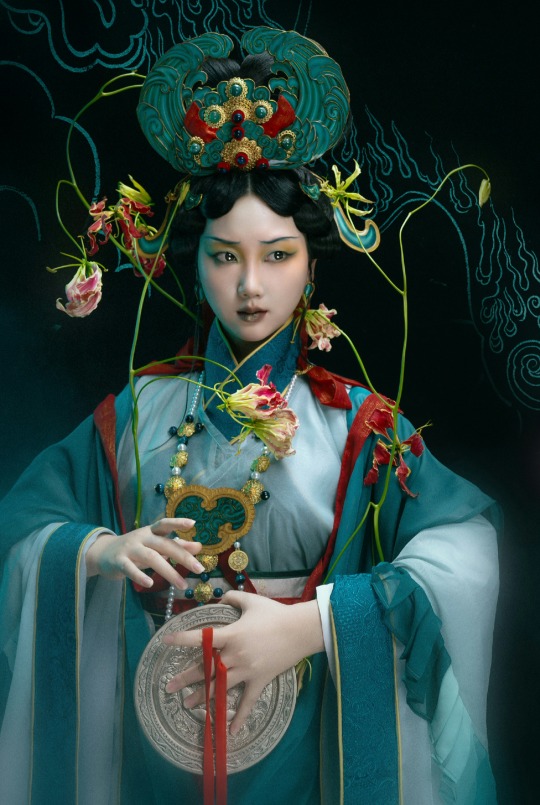
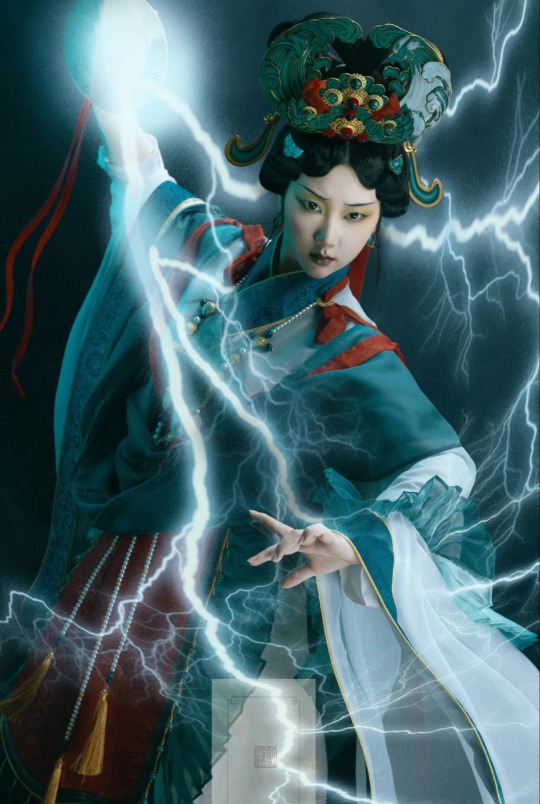
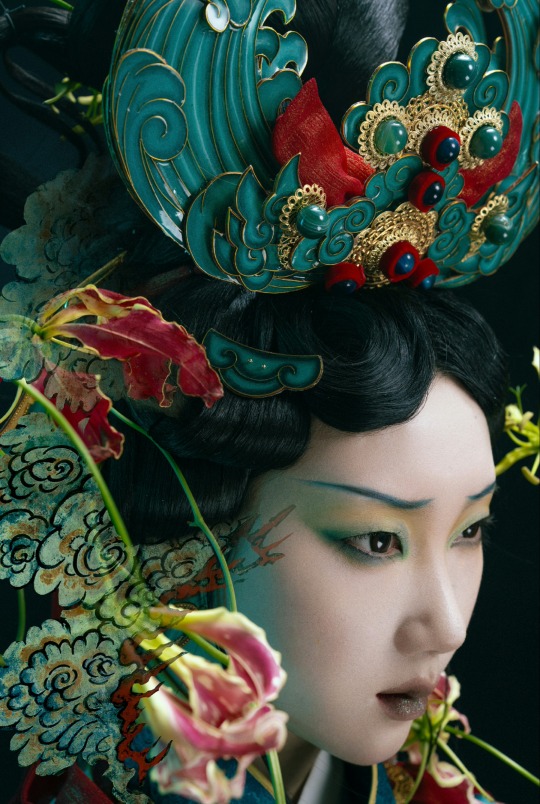
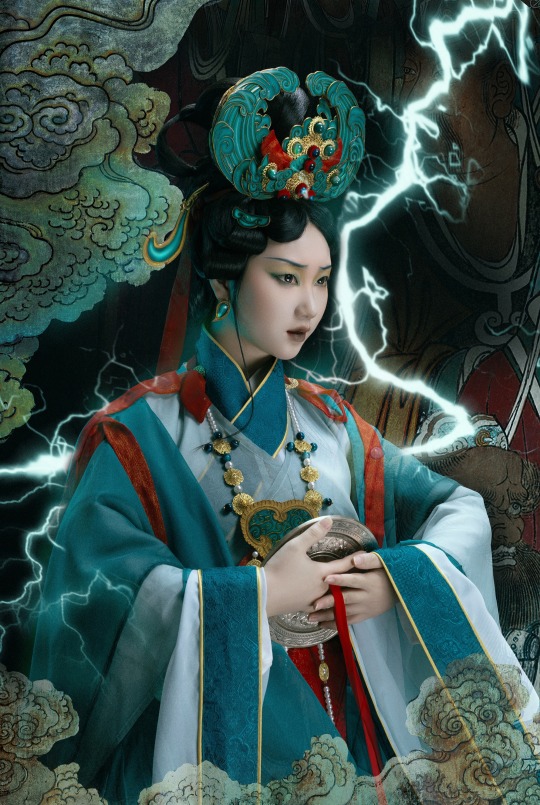
【Historical Artifacts Reference 】:▶ China Yuan Dynasty Taoist Temple 永乐宫/Yongle Palace Mural<电母/Mother of Lightning>

⚡【电母/Mother of Lightning】⚡
电母/Dianmu (Chinese: 電母; pinyin: Diànmǔ; lit. 'Mother of Lightning'), also known as Leizi, is the Chinese goddess of lightning, who is said to have used flashing mirrors to send bolts of lightning across the sky.
She is married to Leigong/雷公, the god of thunder. She is one of the gods who work together to produce the phenomena of thunder. Other companions are Yun Tong (Yún Tóng, 云童, lit. the "Cloud Youth/Kid"), who whips up clouds, and Yu Shi/雨师 ("Rain Master") who causes downpours by dipping his sword into a pot. Roaring winds rush forth from a type of goatskin bag manipulated by Fengbo/风伯 ("Earl of Wind/Wind Uncle"), who was later transformed into Feng Po Po ("Old Lady Wind").
Legend
Dianmu was once a human, who lived with her mother. One day, she was dumping rice husks, because they were too hard for her mother to eat. When the short-tempered thunder god Leigong saw her dumping the husks out, he thought she was wasting food, so he killed her. When the Jade Emperor found out, he was infuriated at Leigong's careless murder. The Jade Emperor revived Dianmu, making her a goddess. Dianmu was made to marry Leigong, who took on the responsibility of caring for her. Dianmu's job is now to work with Lei Gong. She uses mirrors to shine light on the Earth, so Leigong can see who he hits and makes sure they aren't innocent. This is why lightning comes before thunder.
In other depictions
Dianmu also appears in Wu Cheng'en's late 16th-century novel, the Journey to the West; she appears during the events of the Slow Cart Kingdom (車遲國, Chechi), where three 'Animal Strength/Power Immortals', "Tiger Strength", "Deer/Elk Strength" and "Goat/Antelope Strength", three demons who disguised themselves as Taoist magicians to deceive the King of the Kingdom of Chechi, by means of having ended a seemingly-endless drought through the means of a legitimate magic tablet that can control the weather by summoning gods in control of various aspects of the weather, including Dianmu, accompanied by Yún Tóng (云童, lit. the "Cloud Youth"). Once Sun Wukong interrupts the summons, Dianmu and her fellow weather deities help the Buddhists instead of the demons in their rain-making competition.
————————
📸Photography post-production :@小何力
👗Hanfu & 👑Crown:@雁鸿Aimee
💄 Makeup:百丽 (临溪摄影)
👭Model:@清音音音音
🔗 Weibo:https://weibo.com/1615560544/O267AzTqM
————————
#chinese hanfu#immortal hanfu#电母/Mother of Lightning#Chinese mythology#hanfu#hanfu accessories#hanfu_challenge#chinese traditional clothing#china#chinese#hanfu girl#hanfu fashion#chinese history#china mythology#chinese style#漢服#汉服#中華風
475 notes
·
View notes
Text
Legend VS LMK
Nüwa

Legend:
Name:
Mother Goddes, and Member of the Three Sovereigns of Chinese Mythology. The sister and wife of Fuxi. Nuwa is considered the goddess of creation and the female emperor of mankind. Her reverential name is Wahuang (Chinese: 媧皇; lit. 'Empress Wa'). That is due to Nuwa’s position of honor in the Chinese pantheon, Nuwa was given a character completely unique to her name – Wa. Nu is the character of woman and is often used as a prefix for goddesses.

Shes is a godess in Chinese folk religion, Buddihsm, Confucianism and Taoism
She is one of the most venerated Chinese goddesses alongside Guanyin and Mazu.
Origin:
Nuwa was created by her mother, the goddess Huaxu. While wandering the heavenly realms, Huaxu stepped into the footprint of the god of thunder Leigong and suddenly became pregnant. In the earliest versions of the myth, Huaxu gave birth in the earthly realm to only Nuwa.
In later versions, Huaxu gave birth to Nuwa and Fuxi. Nuwa and Fuxi were born with the bodies of snakes and the faces of humans, however, they could shapeshift into humanoid figures with two legs and a tail.
Nüwa & Fuxi Appearances:
The iconography of Fuxi and Nüwa vary in physical appearance depending on the time period and regional differences. In tomb murals and iconography, Fuxi and Nüwa generally have snake-like bodies and human faces or heads.
Nüwa is often depicted holding a compass or multiple compasses, which were a symbol of a dome-like sky. She was also thought to be an embodiment of the stars and the sky or a star god.
Fuxi and Nüwa can be depicted as individual figures arranged as a symmetrical pair or they can be depicted in double figures with intertwined snake-like bodies. Their snake-like tails can also be depicted stretching out towards each other. This is similar to the representation of Rahu and Ketu in Indian astrology.

As some tales of Nüwa and Fuxi, both sprang from the same mother at the same time, Taoists believed that Nuwa was the primordial personification of yin energy (female, gentle, intuitive, and receptive) and Fuxi was representative of the yang (male, fast, active, fierce). Coming together symbolized the reunion of the yin and yang energies which then united to create human existence.
Fuxi and Nüwa can also appear individually on separate tomb bricks. They generally hold or embrace the sun or moon discs containing the images of a bird or a toad (sometimes a hare) which are the sun and moon symbolism respectively. Them holding the sun and the moon appear as early as the late Western Han dynasty.

Other physical appearance variations, such as lower snake-like body shape, depictions of legs. and wings with feathers that protrude from their backs as found in the late Western Han Xinan Tomb or smaller quills found on their shoulders, and in hats and hairstyles.


the Gansu murals dating to the Wei and Western Jin period, one of the most typical features of Fuxi is the "mountain-hat" which looks like a three-peaked cap while Nüwa is depicted wearing various hairstyles characteristic of Han women. Both deities dressed in wide-sleeved clothing, which reflects the typical Han clothing style also commonly depicted in Han dynasty art.
Nüwa and Fuxi Other Stories:
In one version of their myth, soon after the birth of Nuwa and Fuxi, a great flood struck the earth, and only Nuwa and Fuxi remained unharmed after escaping by boat. As the years passed, and with only each other to keep themselves company, Nuwa and Fuxi longed for companionship. Unwilling to violate the laws of heaven by sleeping together as brother and sister, they prayed together seeking a sign of approval.
As they were the only humanoids of their kind left upon the earth, the Emperor of Heaven accepted their union. After mating, Nuwa gave birth to humanity, becoming the matriarch of mankind by giving birth to a ball of meat. Nuwa and Fuxi then divided the meat into pieces shaped as humans and scattered them across the world.
In another version of the creation tale, found in the Classic of Mountains and Seas, Nuwa and Fuxi lived upon legendary Kunlun Mountain. Trying to keep warm on a cold night, the twins created two fires. As the fires burned, they eventually became one. While watching the fires merge, Nuwa and Fuxi joined together as husband and wife. Deciding that they would like to have children, they molded clay into the shape of humans. Using their powers to imbue the small figurines with life, Nuwa and Fuxi created humanity.
Duyi Zhi volume 3, written by LiRong over a thousand years ago, gives a slightly different account of the Chinese creation myth – “There was a brother and a sister living on the Kunlun Mountain, and there were no ordinary people at that time. The sister’s name was Nuwa. The brother and sister wished to become husband and wife but felt shy and guilty about this desire. So the brother took his younger sister to the top of the Kunlun Mountain and prayed: “If Heaven allows us to be man and wife, please let the smoke before us gather; if not, please let the smoke scatter.” The smoke before them gathered together. So Nuwa came to live with her elder brother. She made a fan with grass to hide her face. (The present custom of women covering their faces with fans originated from this story).”
"But most versions give sol credit of humanity's creation to Nuwa. But in some of those Fuxi is credited with introducing a number of innovations and inventions that made significant improvements to the lives of his wife’s beloved creations. One of these, for instance, is the invention of fishing and domesticating animals. "
Creation:
After the goddess Hauxu gave birth to Nuwa, Nuwa roamed the earth alone. The earth was young and teeming with life, filled with blossoming trees and flowers. The lush grounds were covered with many types of animals, the skies were filled with birds, and the seas were full of fish. But while the earth was beautiful, Nuwa felt very lonely, despairing that there was no one to accompany her.
While walking one day, Nuwa was struck by the idea of creating living beings herself. First, she made a new type of bird that could not fly away from her by creating chickens. Then she wanted to make an animal that would be a constant companion, and Nuwa created dogs. On the third day, she made sheep. Then pigs. Then cows. On day six, Nuwa made horses On day seven, while Nuwa walked along a riverbank, she stopped to admire her reflection. As she stroked the hair from her face, she was struck with inspiration and thought to make life forms that looked like her. Nuwa began to scoop and mold yellow clay into figures that had arms and could stand upright upon legs. As she worked the mud in her hands, the figures came alive and began to move and speak. Soon, the creations began to sing and dance around Nuwa while honoring her. All of the loneliness Nuwa had known went away.
Thrilled at her results and filled with passion for her creation, Nuwa desired to make more humans faster. She realized that she could drag rope across the mud and mass produce them, as creating every person individually was beginning to take too much time and hurting her hands. Soon she began to whip the rope, flinging mud and making people faster and faster.
The people Nuwa molded by hand became the wealthy nobility. The ones she made by dragging the rope became commoners. And finally, the ones Nuwa made by whipping the rope became the servant class. As she finished making the last batch of humans it began to rain. Because some of these figures had not yet dried, the rain began to mark them and melt them. The last batch of humans that Nuwa created were damaged by the rain, and thus were the ancestors of those with sickness and deformities.
"She molded humans individually by hand with yellow clay. In other stories where she fulfills this role, she only created nobles and/or the rich out of yellow soil. The stories vary on the other details about humanity's creation, but it was a tradition commonly believed in ancient China that she created commoners from brown mud."
The Pillars:

One of the enduring myths of Nuwa is that of the repairing of the Pillar of Heaven. In the early days of earth’s existence, The earth was separated from the sky by four large pillars which had once been the arms and legs of the creator god, Pangu.
During these early days, the god of water, Gong Gong, and the god of fire, Zhu Rong, had been at odds for many years. Unable to hold back their fury at one another, they engaged in battle to determine who would be the god of the heavens. As they fought, fires raged and floods began to destroy the new earth.
Gong Gong was finally subdued by Zhu Rong, but in his rage, he slammed his head against Buzhou Mountain, one of the four pillars of heaven that had once been Pangu’s leg. An earthquake shook the earth, and the pillar collapsed tearing a hole in the skies.
Looking upon the earth, Nuwa was filled with compassion for her children who were suffering. The new creation of earth had been torn to shreds from the battle between the water and fire gods. Fires burned out of control and water poured in a deluge from the hole in the sky. Nuwa desired to help her children, so she sought out the sky turtle, Ao.
Nuwa threw herself at Ao’s mercy, hoping for a miracle to save her many children. The sky turtle, feeling compassion for the mother of humanity, took Nuwa’s sword and cut off one of his legs, offering it as a substitute pillar. After leaving Ao, Nuwa collected five colored stones (red, yellow, blue, white, and black) and melted them together to repair the hole in the heavens, while using Ao’s leg to replace the pillar.
( The five-colored stones symbolize the five Chinese elements (wood, fire, earth, metal, and water)
Waters poured on her relentlessly as she pushed the leg into position, and once in place, she shoved the ashes of burnt reeds into the remaining holes to plug the leaks. After replacing the pillar and stopping the deluge, Nuwa fell exhausted upon the earth and died.
While many are familiar with the Chinese myth of the Three Sovereigns and Five Emperors, some areas of south China revere Nuwa as one of the Three Sovereigns, reigning as Empress Wa after the death of Fuxi and the rise of Shennong.
Tying into China’s strong ancient matriarchal beliefs, after the reign of Fuxi, the Empress Wa’s rule was challenged by a neighboring tribal chieftan. After defeating the chief in battle, Nuwa dragged her enemy to the peak of Mount Buzhou. Filled with shame, the chief banged his head upon the mountain, tearing a hole in the sky.
As the waters poured from the heavens, the entire world soon flooded, killing all of creation except for her army which was protected by her godhood. Nuwa then found five colored stones and melted them together, patching the hole in the sky.
In other versions of the Pillar of Heaven myth, when Nuwa attempted to fix the sky with the five melted stones she soon found that there was not enough to fix the hole in the sky. Knowing there was no other choice, Nuwa used her own body to fix the remaining hole, sacrificing her life to keep her children safe. With the hole repaired the deluge ended, and humanity was able to thrive and multiply again.
"In all of the myths of the repair of the Pillar of Heaven, due to Ao’s leg being slightly shorter than the original pillars, Nuwa could not align the sky and earth the same as they were before. The sky slanted to the northwest. The earth slanted southeast.
Since the repair, the sun, moon, and stars all rise from the east and set to the west, and all of the rivers in China flow southeast. And due to the use of the multi-colored stones, the clouds of heaven now had different colors."
Other:
In southwest China, many of the minority groups still celebrate Nuwa as their primary goddess and honor her with the yearly Water-Splashing Festival. There are many temples to Nuwa and Fuxi, but the largest temple to the pair lies in Hebei Province, believed to be the ancestral home of all humanity.
The Classic of Mountains and Seas, dated between the Warring States period and the Han dynasty, describes Nüwa's intestines as being scattered into ten spirits.
In Shuowen Jiezi (c. 58 – 147 AD), China's earliest dictionary, under the entry for Nüwa author Xu Shen describes her as being both the sister and the wife of Fuxi. Nüwa and Fuxi were pictured as having snake-like tails interlocked in an Eastern Han dynasty mural in the Wuliang Temple in Jiaxiang county, Shandong province.
In the collection Four Great Books of Song (c. 960 – 1279 AD), compiled by Li Fang and others, Volume 78 of the book Imperial Readings of the Taiping Era contains a chapter "Customs by Yingshao of the Han Dynasty" in which it is stated that there were no men when the sky and the earth were separated. Thus Nüwa used yellow clay to make people. But the clay was not strong enough so she put ropes into the clay to make the bodies erect. It is also said that she prayed to gods to let her be the goddess of marital affairs.
In Ming dynasty myths about the transition from the Shang dynasty to the Zhou dynasty, Nüwa made evil decisions that ultimately benefited China, such as sending a fox spirit to encourage the debauchery of King Zhou, which led to him being deposed. Other tales have her and Fuxi as exclusively the "great gentle protectors of humanity" unwilling to use subterfuge Another telling of that story is from the famed Ming Dynasty novel Fengshen Bang. Nüwa is revered since Xia dynasty for creating the five-colored stones to mend the heavens, which tilted after Gonggong toppled one of the heavenly pillars, Mount Buzhou. Shang Rong asked King Zhou of Shang to pay her a visit as a sign of deep respect. Upon seeing her statue, Zhou was completely overcome with lust at the sight of the beautiful ancient goddess Nüwa. He wrote an erotic poem on a neighboring wall and took his leave. When Nüwa later returned to her temple after visiting the Yellow Emperor, she saw the foulness of Zhou's words. In her anger, she swore that the Shang dynasty would end in payment for his offense. In her rage, Nüwa personally ascended to the palace in an attempt to kill the king, but was suddenly struck back by two large beams of red light. After Nüwa realized that King Zhou was already destined to rule the kingdom for twenty-six more years, Nüwa summoned her three subordinates—the Thousand-Year Vixen (later becoming Daji), the Jade Pipa, and the Nine-Headed Pheasant. With these words, Nüwa brought destined chaos to the Shang dynasty, "The luck Cheng Tang won six hundred years ago is dimming. I speak to you of a new mandate of heaven which sets the destiny for all. You three are to enter King Zhou's palace, where you are to bewitch him. Whatever you do, do not harm anyone else. If you do my bidding, and do it well, you will be permitted to reincarnate as human beings." With these words, Nüwa was never heard of again, but was still a major indirect factor towards the Shang dynasty's fall.
Nüwa and Fuxi were also thought to be gods of silk
LMK:
Long ago, Nüwa sculpted humanity out of clay and mud. She believed her children would not survive the primordial sea of chaos, so she built the Pillar of Heaven and forged the cycles to protect them. But, a cataclysmic event left the pillar shattered. Nüwa crafted five-colored stones and reconstructed the pillar back to its original state. She entrusted four stones to the Four Symbols: the Vermillion Bird, the Black Tortoise, the White Tiger, and the Teal Dragon, the final one to be guarded by the Jade Emperor. After Monkey King's birth, Nüwa repurposed his stone to carry the Harbinger of Chaos. She was saddened by the creature's existence to sacrifice himself but knew that this was a necessary sacrifice to keep her children safe from the chaos beyond.
Thoughts:
Throughout the whole research into her real-world mythology. She has been credited for creating a few animals though monkeys are not mentioned that could be just my research or something else. But I actually found something similar to her pillar story number 3 that nearly matches the LMK version of her fixing the pillars. She was never in the JTTW. But some other thoughts on Nuwa and the pillars I think when she fixed the pillars she accidentally made Wukong. I don't remember where I read this but I think there was a version of JTTW that had the Jade Emperor say something about " Made with the essence of fragments of Godess Nuwas Power" Even if that might not be what I remember right. Maybe it could be in the LMK universe when the crew fought the Nine-headed demon, he used his chaos powers to bind them to certain sections of the wall.


MK is placed over his mural self, the silhouette of his destiny. And the others are placed over the sotnes that would later be them when they smashed them.

But then look at Wukong who is placed in Nuwas hand in the mural of her molding and creating humans.
This could be foreshadowing that it might be revealed and it might hold something of importance later. It might also explain why the goddess chose Wukong as the templet for her harbinger of chaos.
Other Media:
She does appear in the film "The Monkey King: Havoc in Heaven's Palace" and "Journey to the West II", both of which feature Nüwa creating Sun Wukong using one of the five-colored stones. The former film also features Nüwa sacrificing herself to rebuild Heaven, similar to her actions previous to Season 5.
Thnak you for reading if you have something i missed please leave it in the comments thank you :)
101 notes
·
View notes
Text
22. "Why are we doing this again?"
Fandom - Seven Kingdoms: The Princess Problem/7KPP Content warnings - none Pairing - Clarmont x MC Summary - In the wake a dangerous attempt on someone's life, Clarmont reflects and receives a letter. Other notes - contains spoilers for week 5 [A/N - For day 3 of 7KPP Week 2024: Letters as well]
For the umpteenth time that night, Clarmont runs a hair through his tousled hair.
Why is he doing this again? He came here with a goal, a singular, clear goal. Gathering information, forging alliances, all in the name of peace. For the sake of all the innocents who were caught in these deadly games, for the sake of those they’d already lost. How much time had he spent preparing for this? How many times had he repeated this to himself?
And yet, in the end, he’d somehow forgotten it all so easily. All over a single woman.
A woman who somehow met and then exceeded any expectations he had. An intelligent, driven woman who stood firm in the face of adversity and challenge. A beautiful, insightful woman who somehow made him forget himself, the first person in his life who tempted him over the edge of selfishness. All he had to do was jump.
No, not again. He rubs his face with his hands; combined with his lack of rest, he knows he’ll have dark circles under his eyes come morning. No matter how hard he fights, Clarmont finds himself coming back to her, again and again, like a creature underwater drawn to a light on the surface before diving back below, afraid of what it might find when it breaks through.
He can’t do this to her. He knows this, he’s told it to himself over and over. He can’t do this to himself, to the cause he’s utterly devoted himself to for years, completely unwavering, until now.
She might die, he reminds himself, and his heart would likely never recover. He could die, leaving her behind in the most unfair way possible. And given the enormity of the task, the latter seems far more likely. Better to end it now, before they’re too entangled. Better for her to be angry at him, to hate him, than to break her through grief and loss.
He believes in his cause, but Clarmont has long given up on himself. And she deserves more than a man who has nothing left to give.
It isn’t until he hears a knock on his door that he notices the slivers of light dripping in from the gap between the curtains, signaling the onset of morning. In the end, those long late hours did little for him; his resolve is no stronger than before.
The Revaire lord nods absently to his servants when they come in to help him prepare for the day; the gaunt look in his eyes is evident enough, but they know him well enough to not press. He’s handed a small bundle of letters before they bow and leave. Collapsing into a chair, he absentmindedly peruses through his correspondence. There’s a letter from Lyall; he’ll read that one later since he already has an idea of what it might say, and for once he’s not in the state of mind to entertain his friend’s fanciful notions about his bachelorhood.
And mysteriously, a letter hailing from Jiyel in handwriting he doesn’t recognize. The addressee is what surprises him; he doesn’t have any notable contacts from that particular kingdom, aside from one, and she’s here. He looks it over—it doesn’t appear trapped or dangerous in any way. Preliminary checks done, Clarmont gingerly unfurls the parchment.
[ To the esteemed Lord Clarmont of Revaire,
You do not know me, but I write on behalf of my granddaughter, Lady Octavia of House Leigong. My name is Sarantuya, and I have raised and watched Octavia grow since birth. As such, while I know she is perfectly capable of handling her own affairs most of the time, I feel obligated to speak in her favor when it comes to matters of marriage, and of the heart.
She does not speak of you often in a direct way in her letters home, but I know my granddaughter well enough to read between the lines. For a long time, Octavia has always been content in solitary endeavors; there was little that she wanted aside from the pursuit of her own goals. Her heart is not one that is easily stirred. I’m sure you can imagine how surprised I was that she spoke so highly of someone she met during her time at the summit, someone she had intentions to marry, no less.
Truthfully, I worry about my granddaughter. I worry that she will not surround herself with those that care about her. I worry that she will devote so much of herself to her ambitions that she will lose sight of other important things in life. I know as I grow older, I grow closer to a day when I cannot watch over her as I once have.
Lord Clarmont, during your time with her, I am sure you have already gleaned some things about her nature. Octavia can be arrogant and overly reliant on her intelligence. She can pour every ounce of her energy to a task to the point of obsession. She can be cold and indifferent, and care little for strangers, a byproduct of the circumstances in which she was born. My granddaughter has experienced little of the world outside her homeland through no fault of her own. It is my wish that through this summit, she will learn to look beyond the pages of her books and the walls of our small family estate.
In spite of all these things, you will find no one more capable and more devoted. Whatever your dreams are, they will become her dreams, and she will give everything she has to fulfilling them. Whatever challenge you may face, whatever obstacles you must cross, she will stand by you through it all, on her own two feet, strong and proud.
My lord, I can only hope you believe my word when I say my granddaughter is not a weak woman. She has the capacity to reach heights she herself is not aware of yet; the only thing she needs is a supportive hand. The blood of a people who have braved harsh winters, who have survived war, who wander and ride freely through endless, vast plains, courses through her veins. The same blood that runs through my veins. She is not meant to remain in a small cage of her own choosing. It is my wish that she will find the opportunity to fly, and it is my belief that you may be the one who can help her.
I cannot see the future and I will not compel you to a decision. But from what I know, I hope one day to have the pleasure of calling you my grandson. Please watch over Octavia in the meantime.
Safe journeys,
Qiyan Sarantuya of House Leigong ]
Clarmont leans back in his chair, staring up at the ceiling as his sleep-deprived mind struggles to process everything.
My granddaughter is not a weak woman.
He knows that. He knows that so painfully well. Because in the end, he knows that he’s the weak one, and he’s never been more frustrated over it.
Maybe…
He shakes his head, painfully aware of the bright sunshine breaking through to dispel the shadows of the night. Time is not a luxury he has, and eventually he has to face his demons. He folds the letter and sets it aside for safekeeping, praying from the depths of his heart that he can live up to whatever expectations people may have of him.
11 notes
·
View notes
Text
if death must die was more popular they would be doing bonkers things to leigong's cervix on twitter
7 notes
·
View notes
Text
more perfumes from my wishlist
leigong mountain by le goût de peau


human by contradictions in ilk


bit bit by agar olfactory


nature by contradictions in ilk


black dog by d.grayi


8 notes
·
View notes
Text


It has come to my attention that i have indeed abandoned this account... sorry guys it's hard managing a twt, insta & tiktok all at the same time. However what I do have is an OC reference sheet of my oc Tao :]
[MINI INTRODUCTION 🌩⚡️] Tao, a once lightning deity under the parental guide of Leigong, has then been punished and exiled now turned demon. Tao in the present is a lightning demon, a blindfold around his eyes, and an aura that makes you feel at ease. He's a kind gentleman with questionable morals and questionable work. He runs a community where orphan and poor children alike can learn under the same roof. He teaches them basic knowledge of the world as well as martial arts. Aside from that, he is a local sales men that sells rice wine on the sidelines every now and then. He's popular with sales yet for only limited time. But that's nothing since he's the father of Lei-zhi, nonbiological, that is. I might talk about it once I make a Lei-zhi character sheet, but in short, Tao spotted Lei-zhi getting bullied by the local children in a rundown town. Tao swiftly saved him and offered Lei-zhi if he wanted to be taken under his wing. Lei-zhi agreed, and ever since then, Lei-zhi considered Tao his father.
if you like you may ask some questions abt him if it reaches a larger audience :DD
#lego monkie kid#monkie kid#lego monkey kid oc#lego monkie kid oc#monkie kid oc art#monkie kid oc#lmk ocs#lmk oc art#oc art#lmk fandom#oc artwork
11 notes
·
View notes
Text

Prancing Moogle art party from 11-19-23!!
#mine#my art#ffxiv#ffxiv elezen#ffxiv au'ra#ffxiv miqo'te#ffxiv viera#friends#Ocavisha#Gihbreel#Leigong#Kalico#Honey#Arnold#prancingmoogle#prancing moogle#prancingmoogleartparty
4 notes
·
View notes
Note
Given how Gandharva confirmed that each worlds has their own Indra/God of thunder and lighting, I decided to list down who they are for fun. So far:
Indra of Deva Loka
Sakra of Shangri La
Zeus of Olympus
Raijin of Takamagahara
Thor of Yggdrasil
Heyoka/Thunderbird of Great spirit
Tawhiri of Oceanic realm
Kanna Kamuy of Kamuy Kotan
Chaac of El Dorado
Baraqiel of Eden/Gehenna
Perkunas of Tir na Nog
Dianmu/Leigong of Penglai
Interesting
12 notes
·
View notes
Text
Tetsuna's Kinktober Finale: Shipping Edition
#knb#kuroko's basketball#tsc#shadowhunters#the shadowhunter chronicles#shadowhunter chronicles#sk#shaman king#vk#vampire knight#hdn#hyperdimension neptunia#free!#free! iwatobi swim club#free! anime#free! the final stroke#free! dive to the future#midorima shintarou#takao kazunari#midorima x takao#kit herondale#ty blackthorn#kit x ty#haruka nanase#makoto tachibana#makoharu#jeanne x ren#ren tao#jeanne tao#maria kurenai
10 notes
·
View notes
Text

ah, yes, a ‘wind sack which controls windiness’. my eloquence truly knows no bounds.
#for context… i’m trying to assign the SoDF’s crew members to the main deities related to leigong#and i am Struggling to make it work#not to mention how on earth mimi has anything whatsoever to do with rainfall#if anything that role would suit dan feng/dan heng the best because of his water-based dragonliness#(yet more stunning eloquence on display here)#but he isn’t a main member of the crew… so it doesn’t really work#r’s random thoughts
3 notes
·
View notes